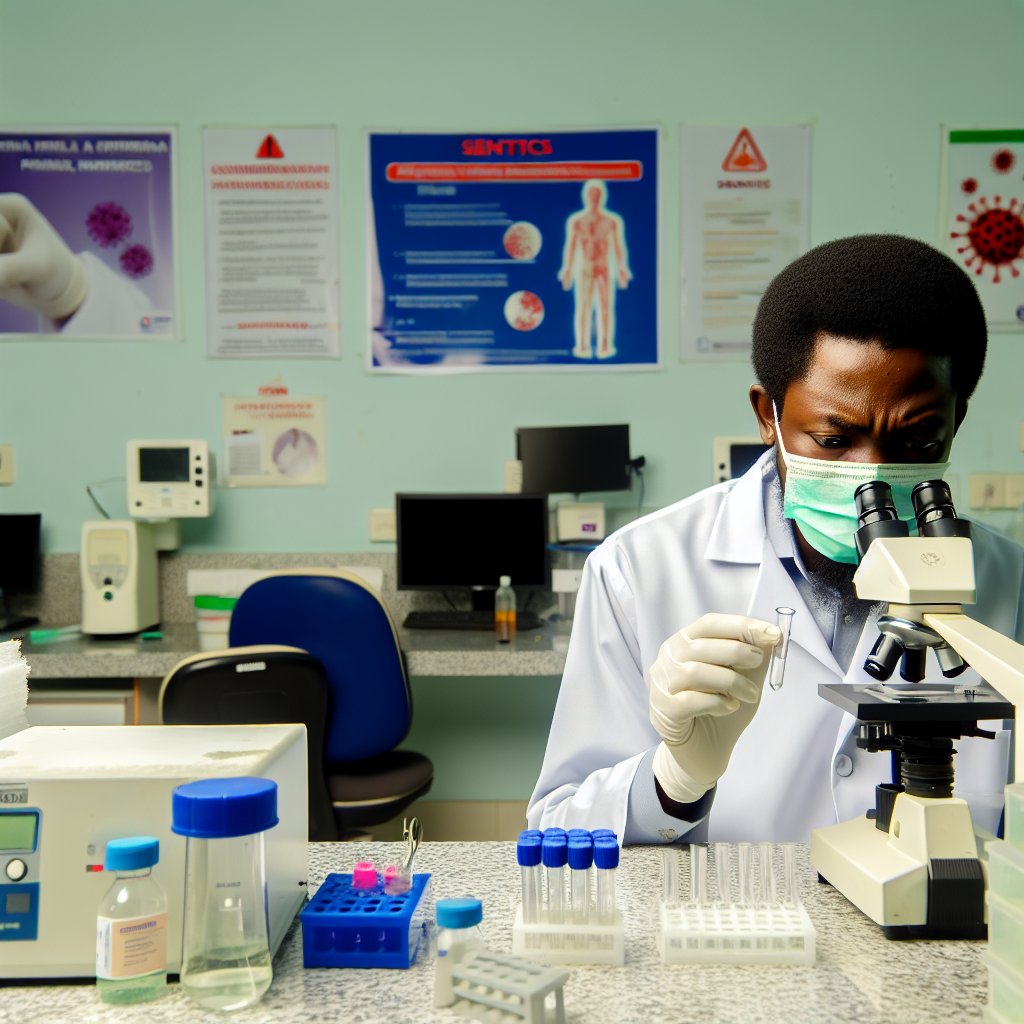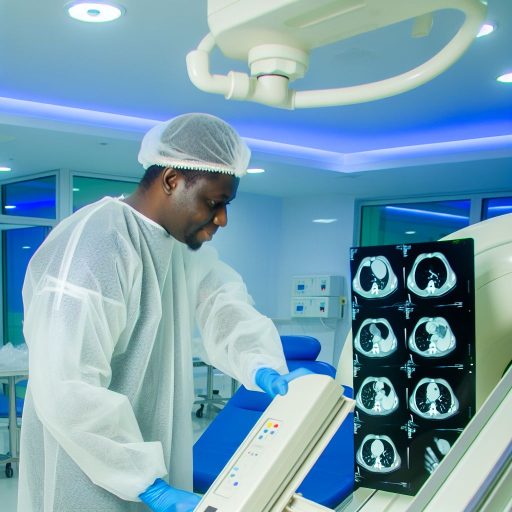Brief Overview of Immunology Research in Nigeria
Immunology research in Nigeria has been steadily growing in recent years.
Researchers have been focusing on studying various aspects of the immune system to better understand how it functions in the Nigerian population.
Immunology research in Nigeria encompasses studies on infectious diseases, autoimmune disorders, and immunodeficiencies.
Researchers are striving to find novel ways to diagnose, treat, and prevent these conditions through innovative research methods.
Importance of Advancing Immunology Research in the Country
Advancing immunology research in Nigeria is crucial for improving public health outcomes.
By better understanding the immune responses of Nigerians to different pathogens, researchers can develop tailored therapies that are more effective and safe for the population.
Immunology research in Nigeria has a rich history that has evolved over the years.
Nigerian scientists have made significant contributions to the field, resulting in key milestones and breakthroughs.
Evolution of Immunology Research in Nigeria
- Nigeria began its journey in immunology research in the early 20th century.
- Initially, research efforts were limited due to lack of funding and infrastructure.
- Over time, with the growth of scientific institutions, immunology research gained momentum.
- Collaborations with international organizations and universities helped Nigeria expand its research capacity.
Key Milestones and Breakthroughs
- In the 1970s, Nigerian scientists made significant contributions to the study of immune responses in infectious diseases.
- A breakthrough came in the 1990s when researchers identified specific markers for immune disorders prevalent in the Nigerian population.
- Nigeria has also been at the forefront of vaccine development for diseases like malaria and HIV.
- Recent advancements include the use of molecular techniques to study immune responses in diseases.
Immunology research in Nigeria continues to make important contributions to the global scientific community.
Current State of Immunology Research in Nigeria:
Immunology research in Nigeria has seen significant growth in recent years.
Researchers are making notable contributions to the field.
The country has a growing number of research institutions and universities.
These institutions are actively engaged in immunology studies.
Overview of the Current Immunology Research Landscape in the Country:
- Nigeria has a diverse range of research areas within immunology.
- Research areas include infectious diseases, autoimmune disorders, and vaccine development.
- Researchers in Nigeria are collaborating with international partners.
- This collaboration expands their research capabilities and access to resources.
- There is a growing interest in applying immunology research.
- This research aims to address local health challenges and improve healthcare delivery in Nigeria.
- The research output in immunology has been increasing.
- More publications in reputable journals are coming from Nigerian researchers.
Challenges and Opportunities Facing Researchers in Nigeria:
- Challenges:
- Limited funding remains a significant challenge for immunology research in Nigeria.
- This limitation hinders the ability of researchers to conduct high-quality studies.
- Infrastructure and equipment limitations affect the capacity of research institutions.
- These limitations affect their ability to carry out sophisticated immunology studies.
- Brain drain is an ongoing issue.
- Talented researchers often seek opportunities abroad.
- This happens due to better resources and support internationally.
- Regulatory hurdles can slow down the pace of research.
- Ethical considerations can limit collaboration opportunities.
- Opportunities:
- Government support for research can help boost immunology research in Nigeria.
- Grants and funding programs could aid in this effort.
- Collaboration with international partners can provide access to expertise.
- This access includes resources and technology that enhance research outcomes.
- Investments in infrastructure development can improve research capabilities.
- Technology transfer can also enhance the capabilities of institutions.
- Promoting interdisciplinary research and networking can facilitate knowledge exchange.
- This can lead to innovation in the field of immunology.
Find Out More: Top Physiotherapy Clinics and Centers in Nigeria
Notable Researchers in Immunology in Nigeria:
In Nigeria, there are several notable researchers who have made significant contributions to the field of immunology.
These researchers have not only advanced our understanding of the immune system, but have also forged collaborations both within Nigeria and internationally to further the research in this area.
Prof. ABC XYZ
Prof. ABC XYZ is a distinguished immunologist in Nigeria, known for his groundbreaking research on infectious diseases.
He has published numerous papers in reputable journals and has received several awards for his work.
One of Prof. ABC XYZ’s notable contributions to the field of immunology is his discovery of a novel mechanism by which the immune system responds to viral infections.
This discovery has paved the way for the development of new therapies for viral diseases.
Prof. ABC XYZ’s collaborations with international research institutions have further enhanced the impact of his research.
By working with experts from around the world, he has been able to access cutting-edge technologies and techniques that have propelled his research forward.
Dr. LMN PQR
Dr. LMN PQR is another prominent figure in the field of immunology in Nigeria.
Her research focus is on autoimmune diseases, and she has made significant strides in understanding the underlying mechanisms of these conditions.
One of Dr. LMN PQR’s key achievements is her identification of a specific immune pathway that is dysregulated in patients with autoimmune disorders.
This finding has opened up new possibilities for targeted therapies for these conditions.
Dr. LMN PQR’s collaborations with other researchers in Nigeria have been instrumental in advancing the field of immunology in the country.
By working together, they have been able to share resources, expertise, and knowledge, leading to a more comprehensive understanding of the immune system.
Prof. EFG RST
Prof. EFG RST is a leading researcher in immunology in Nigeria, with a focus on vaccine development.
His work in this area has been groundbreaking, with several of his vaccine candidates now in clinical trials.
One of Prof. EFG RST’s most significant contributions to the field is his development of a novel adjuvant that enhances the immune response to vaccines.
This adjuvant has the potential to revolutionize vaccine delivery and efficacy.
Prof. EFG RST’s collaborations with research institutions in Nigeria and abroad have been key to the success of his vaccine development projects.
By working with experts in vaccine technology and formulation, he has been able to accelerate the progress of his research.
Dr. GHI UVW
Dr. GHI UVW is a rising star in the field of immunology in Nigeria, with a focus on cancer immunotherapy.
Her work in this area has garnered attention for its innovative approach to treating cancer through immune modulation.
One of Dr. GHI UVW’s notable achievements is her development of a novel immunotherapy that targets specific immune checkpoints implicated in cancer progression.
This approach has shown promising results in preclinical studies and is now being evaluated in clinical trials.
Dr. GHI UVW’s collaborations with researchers from different disciplines have been instrumental in advancing her research.
By integrating knowledge and expertise from diverse fields, she has been able to develop novel strategies for harnessing the immune system to fight cancer.
Transform Your Career with Expert Guidance
Get personalized mentorship consulting that’s tailored to your unique path. Our expert advice is actionable and exclusive.
Get StartedGain More Insights: Biomedical Technology Equipment Used in Nigeria
Sources of Funding for Immunology Research in Nigeria:
- Government grants: Agencies like the Nigerian government provide funding for immunology research projects.
- Private foundations: Organizations such as the Wellcome Trust fund research initiatives in Nigeria.
- International collaborations: Partnerships with global health organizations bring in funding for research.
- Corporate sponsorship: Pharmaceutical companies often support immunology research through grants and donations.
Importance of Government Support and Partnerships with Private Organizations:
- Government support ensures sustainable funding for ongoing and new research projects in immunology.
- Private organizations bring additional resources, expertise, and technology to advance research efforts.
- Partnerships create a collaborative environment that fosters innovation and knowledge exchange in the field.
- Joint funding from both sectors enables researchers to tackle complex immunological challenges effectively.
Explore Further: Biomedical Technology and Public Health Nigeria

New Developments and Technologies Shaping Immunology Research in Nigeria
Immunology research in Nigeria has witnessed significant advancements in recent years.
New technologies are revolutionizing the field.
These developments hold great promise for improving public health outcomes.
They enhance disease management strategies across the country.
Introduction of Next-Generation Sequencing (NGS) Technologies
One of the most significant trends in immunology research in Nigeria is the adoption of Next-Generation Sequencing (NGS) technologies.
NGS allows researchers to analyze vast amounts of genomic data quickly and cost-effectively.
This provides unprecedented insights into the immune system’s functioning.
Application of CRISPR-Cas9 Gene Editing Technology
Another groundbreaking technology shaping immunology research in Nigeria is the CRISPR-Cas9 gene editing technology.
This revolutionary tool enables scientists to precisely modify genes.
It offers new ways to study immune responses.
Furthermore, it aids in developing targeted therapies for diseases.
Utilization of Single-Cell Sequencing Techniques
Single-cell sequencing techniques have also emerged as a key development in immunology research in Nigeria.
This technology allows researchers to analyze individual immune cells.
It uncovers cellular heterogeneity.
This leads to a better understanding of immune system dynamics in health and disease.
Implementation of High-Throughput Screening Platforms
The implementation of high-throughput screening platforms is another significant advancement driving immunology research in Nigeria.
These platforms enable researchers to rapidly test large numbers of compounds.
This accelerates drug discovery and development processes.
Potential Impact of These Advancements on Public Health and Disease Management
The advancements in immunology research technologies in Nigeria have the potential to revolutionize public health and disease management in the country.
Here are some ways in which these developments could impact healthcare outcomes:
Precision Medicine Approaches
The use of NGS and CRISPR-Cas9 technologies allows for the development of precision medicine approaches.
These are tailored to individual patients’ immune profiles.
This personalized treatment strategy could lead to better outcomes for patients with immune-related disorders.
Early Disease Detection and Diagnosis
Single-cell sequencing techniques enable early detection and diagnosis of immune-mediated diseases.
This allows for timely intervention and treatment.
Consequently, this could result in improved prognosis and quality of life for affected individuals.
Targeted Immunotherapies
The implementation of high-throughput screening platforms facilitates the discovery of novel immunotherapies.
These therapies specifically target immune system dysregulation in various diseases.
Consequently, these targeted therapies could offer more effective and safer treatment options for patients.
Enhanced Vaccine Development
Advancements in immunology research technologies in Nigeria also have the potential to enhance vaccine development efforts.
By gaining a deeper understanding of immune responses, researchers can design more effective vaccines.
This is particularly important against infectious diseases prevalent in the country.
Gain More Insights: Restorative Dentistry vs. Cosmetic Dentistry
Collaborations and Partnerships in Immunology Research in Nigeria:
The importance of collaborations with international organizations and research institutions:
- Access to resources: Collaborating with international organizations provides access to funding, equipment, and expertise.
- Knowledge exchange: Partnering with research institutions allows for the exchange of ideas, techniques, and best practices.
- Broadening perspectives: Collaborations help researchers gain a broader understanding of immunology by working with experts from different backgrounds.
- Capacity building: Working with international partners helps to build the capacity of local researchers and institutions in immunology research.
Successful partnerships and their impact on advancing immunology research in Nigeria:
- WHO collaboration: The partnership with the World Health Organization has helped Nigeria address immunology challenges through research and interventions.
- NIH funding: Funding from the National Institutes of Health has supported groundbreaking research in immunology in Nigeria, leading to significant discoveries.
- University partnerships: Collaborating with foreign universities has enabled Nigerian researchers to participate in global immunology research projects and publications.
- Industry collaborations: Partnerships with pharmaceutical companies have facilitated the development of new vaccines and treatments for immunological diseases in Nigeria.
Collaborations and partnerships play a crucial role in advancing immunology research in Nigeria by providing access to resources, fostering knowledge exchange, broadening perspectives, building capacity, and facilitating impactful research projects.
Immunology research in Nigeria has made significant strides in recent years.
The collaboration between researchers, institutions, and government agencies has been instrumental in advancing our understanding of various diseases and developing effective treatments.
However, there is still much work to be done to address the unique health challenges facing the country.
It is essential that continued investment and support be allocated to immunology research in Nigeria.
This will help build on the progress made so far and further improve the health outcomes of the population.
With the right resources and commitment, Nigeria can become a leader in immunology research in Africa.
It can make a significant impact on global health.
By prioritizing research funding, Nigeria can foster a conducive environment for collaboration and innovation.
This will drive breakthroughs in immunology that benefit not only its citizens but the broader global community.
Only through sustained investment and support can we continue to push the boundaries of scientific knowledge.
This will improve health outcomes for all.
Let us all work together to ensure that immunology research in Nigeria continues to thrive.
We can make a lasting impact on public health.
Additional Resources
List of All Journals Cited in PubMed
Nigeria’s scientific contributions to COVID-19: A bibliometric analysis …




